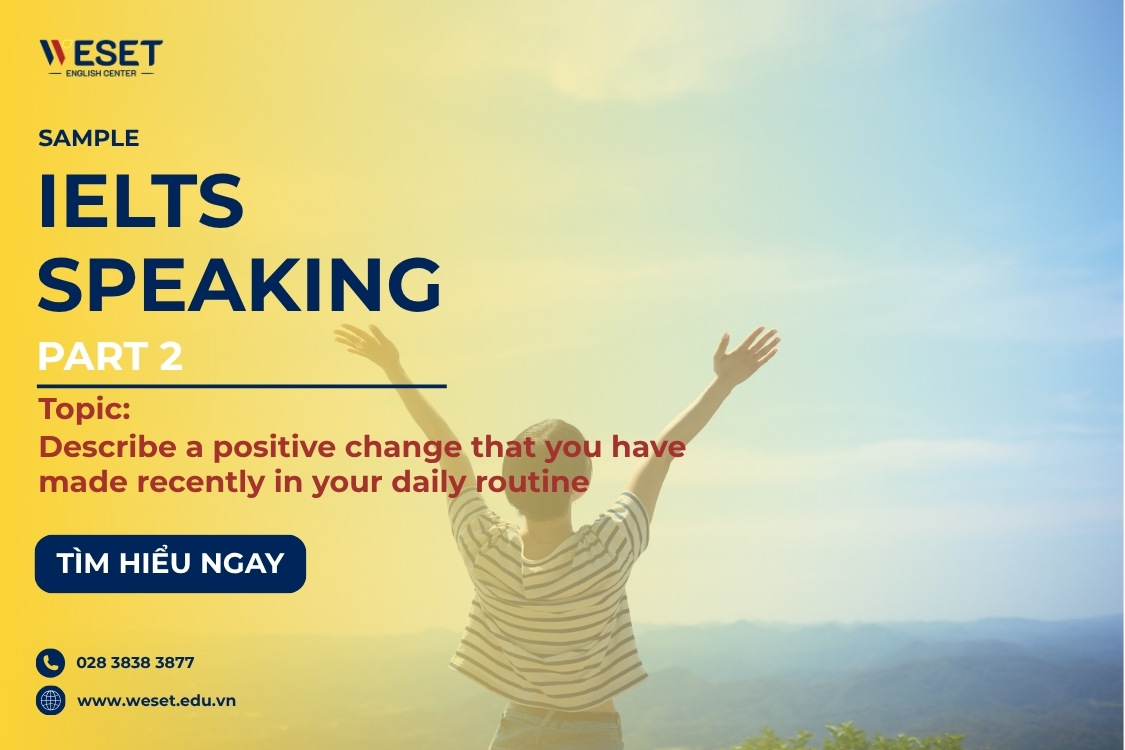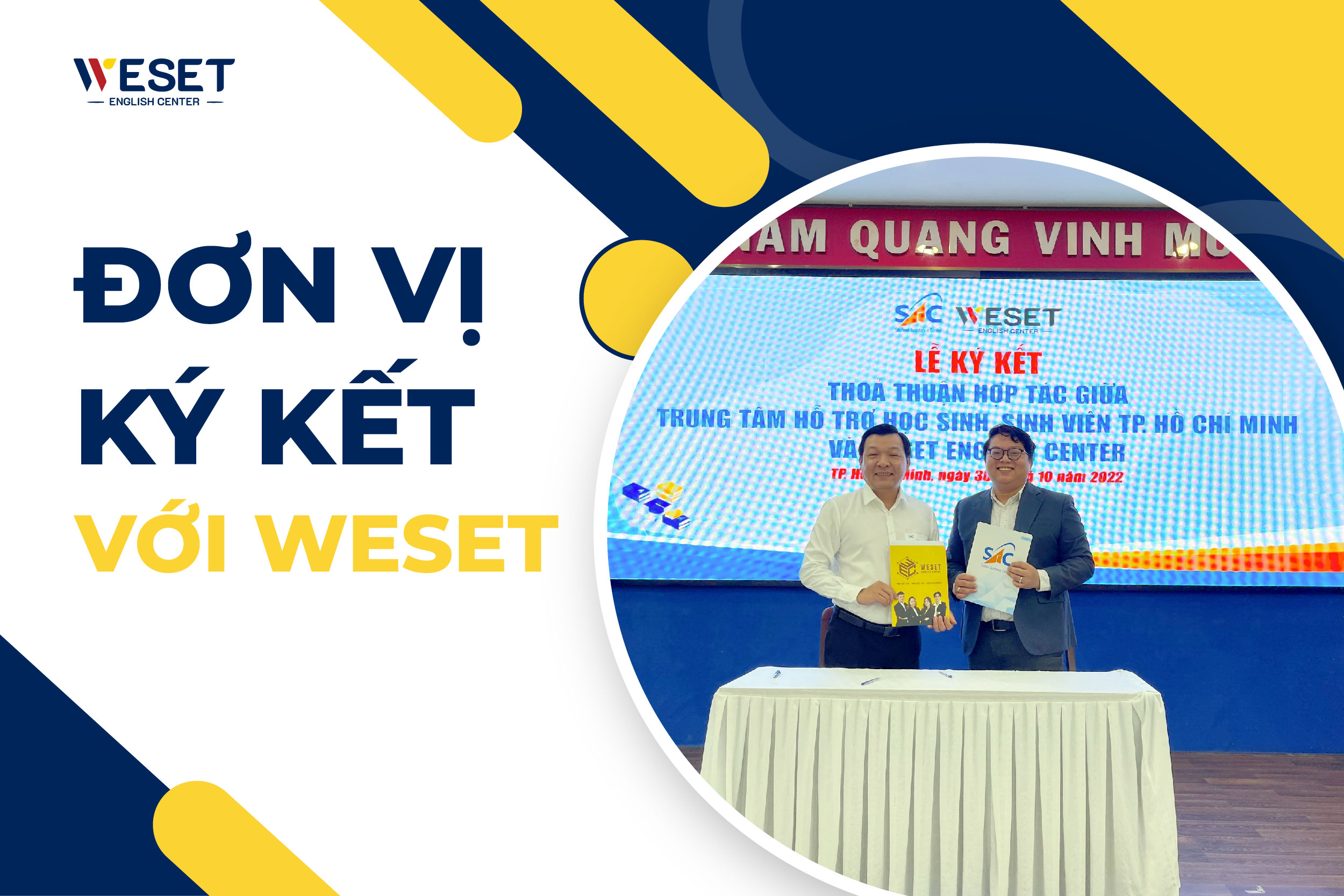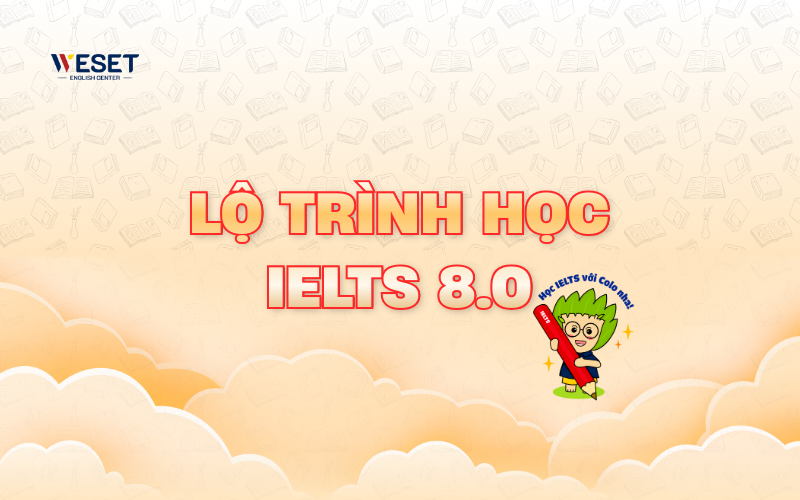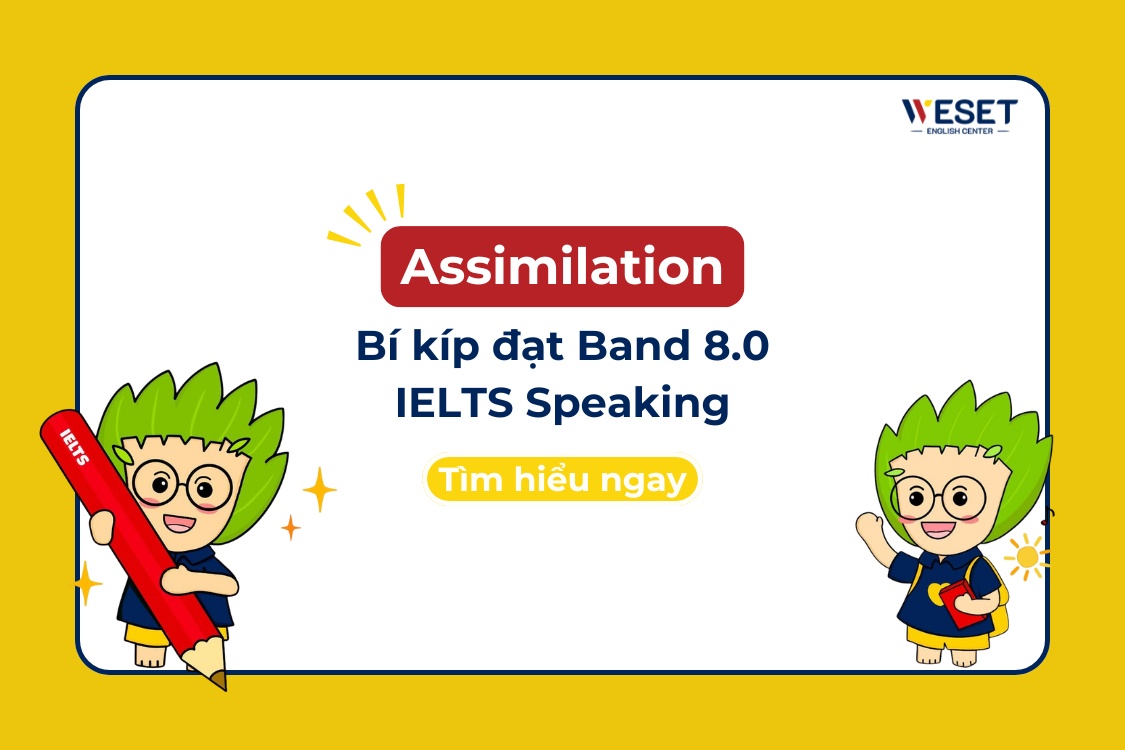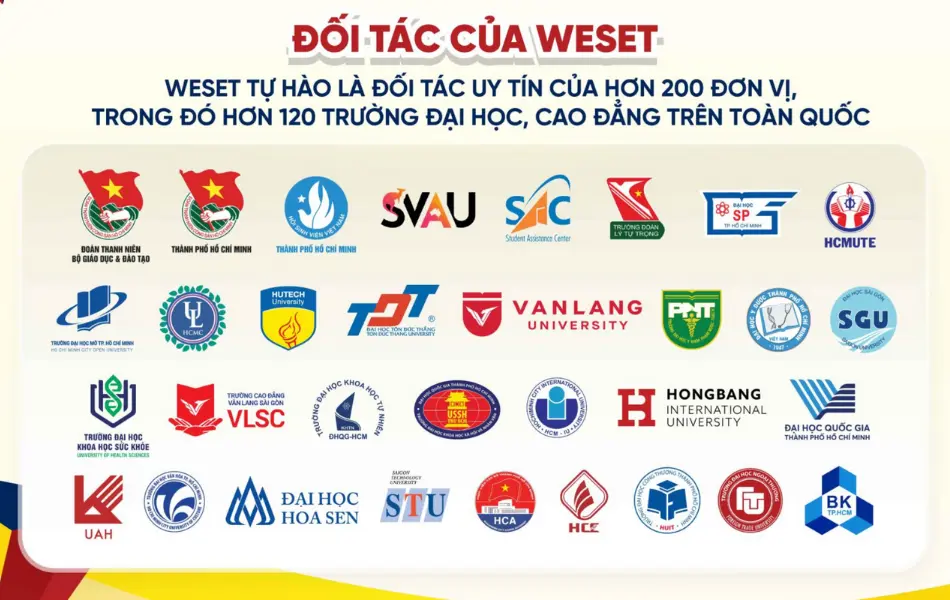Trang chủ Blog Bài thi IELTS mẫu IELTS Speaking Part 2: Positive Changes for Daily Life
IELTS Speaking Part 2: Positive Changes for Daily Life
- WESET DIGITAL
- Bài mẫu IELTS Sample Speaking, Bài thi IELTS mẫu
MỤC LỤC
Part 2: Describe a Positive Change That You Have Made Recently in Your Daily Routine
You should say:
- What the change is
- How you have changed the routine
- Why you think it is a positive change
- And explain how you feel about the change.
| Question | Answer |
|---|---|
| What the change is | A meaningful improvement that I have made recently in my daily routine is going to the gym on a regular basis. About two months ago, I decided to start working out because before that, I often felt exhausted and even had frequent body aches due to my sedentary lifestyle. It really affected both my energy and concentration, so I realized I had to make a change. |
| How you have changed the routine | To build this habit, I rearranged my daily schedule by waking up a bit earlier than usual and setting aside one hour every evening after school to work out. At first, it was pretty hard for me to stay consistent, I used to think about giving up a few times, but after some weeks, it gradually became part of my routine. Now, I usually spend around four to five sessions per week at the gym, doing a combination of cardio, weight training, and stretching. Interestingly, once I started paying more attention to my health, I also became more conscious of my diet. As a result, I try to cut down on junk food, drink more water, and add more protein and vegetables to my meals. |
| Why you think it is a positive change | I consider this a positive change for several reasons. Firstly, it has had a remarkable impact on my physical health. I rarely feel exhausted now as my stamina has increased noticeably, and even my sleep quality has improved too. Secondly, working out regularly and eating better have helped me relieve stress and clear my mind, which is really vital since I often have to deal with academic pressure and some troubles in my life. Finally, this routine has given me a sense of discipline, as it requires careful planning and consistency in how I manage my time and lifestyle. |
| And explain how you feel about the change | Overall, I feel really satisfied with this change because it proves that I can be determined and persistent once I put my mind to something. Going to the gym and continuing a balanced diet have not only transformed my body but also boosted my confidence and mental well-being. I truely believe that this is one of the most worthwhile decisions I have made recently, and I plan to stick with this healthy routine in the long run. |
Part 3: Discussion Questions and Answers
1. Who Should Get More Promotion Opportunities in the Workplace, Young People or Older People?
I’m convinced that promotion opportunities should be determined primarily by competence and contribution, rather than by age. Older employees often bring a wealth of institutional knowledge, seasoned judgment and a sense of stability that younger staff can benefit from. On the other hand, young professionals are usually more adaptable and tech-savvy, which is invaluable in fast-evolving fields like digital marketing or information technology. However, age shouldn’t be the deciding factor. What truly matters is performance, innovation and leadership quality. Workplaces should foster a meritocratic culture where both young and senior employees can rise on the strength of their abilities regardless of age.
2. Who Do You Think Would Make Changes More Often, Young People or Old People?
Generally speaking, young people are far more likely to embrace change and experiment with new directions in life. They’re still in the exploratory phase of personal growth, therefore, they tend to view change as a gateway to self-discovery and improvement. Many of them haven’t yet settled down with long-term commitments like family which gives them greater flexibility to take risks or relocate. For instance, young professionals today are much more willing to switch careers. Older individuals, in contrast, often gravitate toward stability once they’ve established a career of their own.
3. Do You Think It Is Good to Change Jobs Frequently?
Well, it depends heavily on the motives and timing behind each move. On one hand, changing jobs can be tremendously beneficial if done strategically – it can broaden one’s exposure to different industries, expand professional networks and help develop a more versatile skill set. However, constant job-hopping without direction can backfire. Employers may perceive it as a lack of commitment or resilience and it might prevent someone from fully mastering a role or seeing long-term projects through. So, I think the key lies in balance: changing jobs can be highly rewarding when driven by ambition and growth, but it becomes counterproductive when it’s done out of boredom or impulse.
4. What Changes Would People Often Make?
In modern life, people tend to make a variety of changes, both major and subtle. Professionally, individuals might pivot to a different industry, pursue postgraduate education, or even launch entrepreneurial projects to expand their horizons. Relocation is also common, people may move to new cities or countries seeking better job opportunities or a higher quality of life. On a more personal level, lifestyle modifications are equally significant. Many people today reassess their health habits, such as adopting plant-based diets, incorporating exercise routines or improving their sleep patterns. All these transformations stem from a desire for progress, fulfilment and self-actualization.
5. Is Time Management Very Important in Our Daily Lives?
Time management is the linchpin of both personal effectiveness and emotional stability. When people structure their time wisely, they can maintain equilibrium between work, study and leisure so as to avoid the chronic stress that often comes with disorganization. In today’s hyperconnected, fast-paced world, we’re constantly juggling multiple roles, therefore, without proper planning, burnout becomes almost inevitable. Personally, I think mastering time management isn’t just about productivity; it’s also about living intentionally by allocating time to what truly matters. For instance, setting clear priorities, breaking tasks into manageable parts and minimizing distractions can make an enormous difference in performance. Ultimately, managing time well is less about doing more and more but is about doing what matters most, efficiently and meaningfully.
6. What Do People Normally Plan in Their Daily Lives?
In general, most people plan their days quite meticulously to keep a sense of order and direction. On a basic level, this involves organizing work-related tasks, study goals and personal commitments. For instance, many people allocate time for exercise, family gathering or social interactions to maintain balance in their lives. Some individuals even plan their downtime intentionally, understanding that rest and recreation are equally important for productivity. In essence, daily planning helps people navigate the chaos of modern life, prioritize what truly matters and make consistent progress toward long-term aspirations. It’s not about being rigid but about creating structure that supports flexibility and balance.
NEW WORDS AND PHRASES
Part 2:
- on a regular basis: một cách thường xuyên, đều đặn
- sedentary lifestyle: lối sống ít vận động, ngồi nhiều
- set aside: dành ra, để riêng (thời gian/tiền bạc cho mục đích cụ thể)
- be conscious of: nhận thức về, ý thức về
- cut down on: cắt giảm, hạn chế
- remarkable impact: tác động đáng kể, ấn tượng
- stamina: sức bền, khả năng chịu đựng (thể chất hoặc tinh thần)
- academic pressure: áp lực học tập
- a sense of discipline: ý thức kỷ luật
- determined: kiên quyết, có quyết tâm
- persistent: kiên trì, bền bỉ
Part 3:
- a wealth of institutional knowledge: kiến thức chuyên sâu tích lũy được
- indispensable assets: tài sản không thể thay thế
- meritocratic culture: văn hoá dựa trên thành tích
- capability over chronology: năng lực quan trọng hơn tuổi tác
- tangible benefits: lợi ích cụ thể, rõ ràng
- transformational and incremental changes: thay đổi lớn và thay đổi nhỏ
- enhance their prospects: cải thiện triển vọng
- reassess their priorities: đánh giá lại ưu tiên
- the cornerstone of personal effectiveness: nền tảng cho hiệu quả cá nhân
- diminished output: hiệu suất giảm sút
- living intentionally: sống có chủ đích
- allocate energy toward meaningful goals: dành năng lượng cho mục tiêu ý nghĩa
- enhance productivity and emotional well-being: nâng cao năng suất và sức khỏe tinh thần
WESET English Center – Luyện thi tiếng Anh cam kết đầu ra
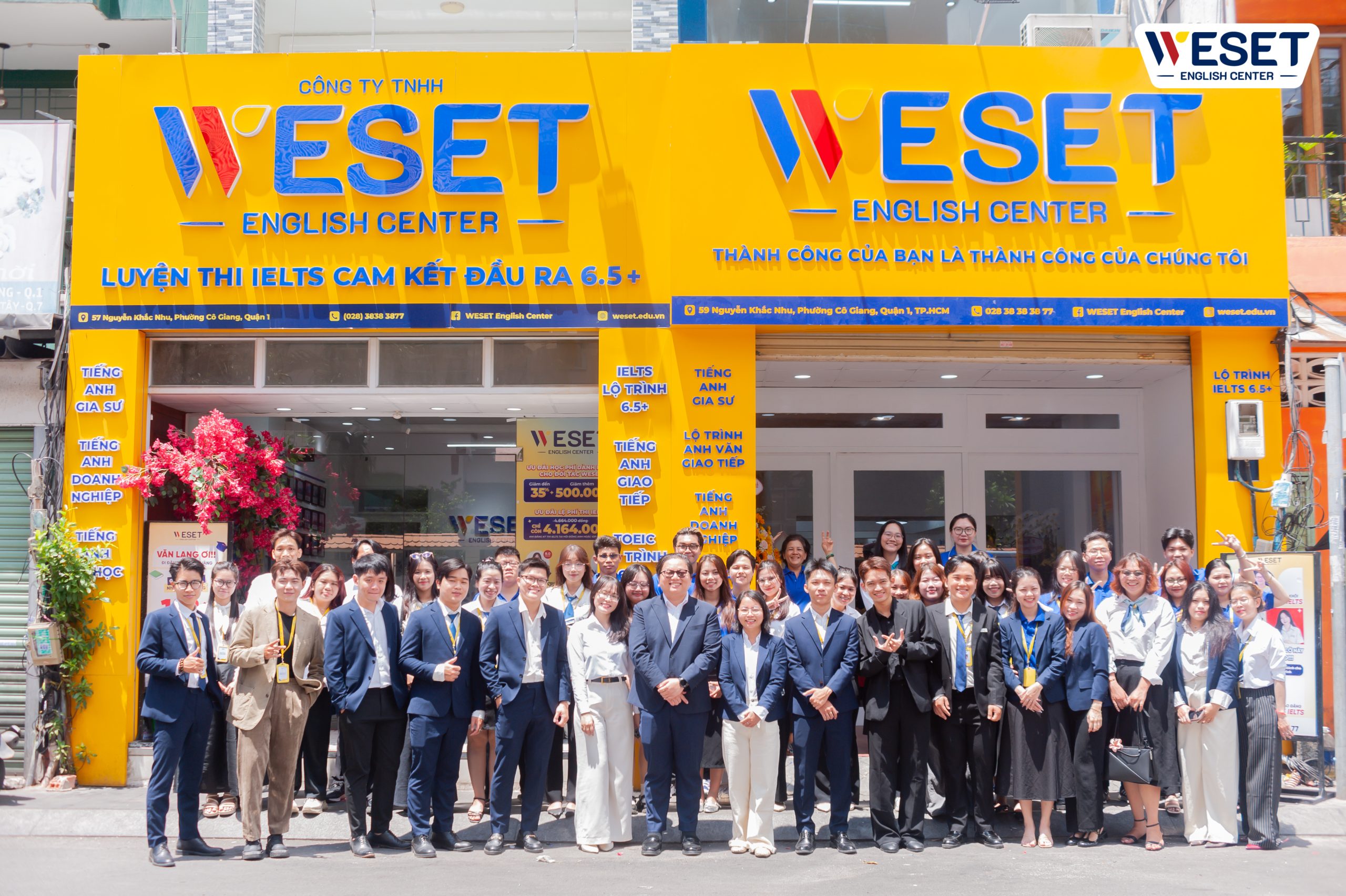
WESET English Center
WESET English Center – trung tâm luyện thi tiếng Anh cam kết đầu ra tại TP HCM. Với nhiều năm kinh nghiệm trong lĩnh vực đào tạo tiếng Anh và luyện thi IELTS, WESET tự hào là trung tâm luyện thi IELTS, luyện thi TOEIC chuyên sâu uy tín giúp hàng ngàn học viên đạt được ước mơ du học, định cư và phát triển sự nghiệp
Những điều chỉ có tại WESET
- Chất lượng giáo viên: Đội ngũ giáo viên có IELTS từ 7.5+ là Cử nhân trường ĐH Sư phạm/Thạc sĩ chuyên ngành giảng dạy tiếng Anh/Ngôn ngữ, sở hữu chứng chỉ nghiệp vụ sư phạm/TESOL/CELTA.
- Cam kết IELTS đầu ra đến 8.0+ bằng văn bản.
- Tổ chức hoạt động ngoại khoá: workshop chuyên môn; hoạt động tiếng Anh 100% hàng tuần (Speaking club); sự kiện chia sẻ kiến thức, kinh nghiệm học tiếng Anh, du học,…
- Đối tác uy tín: Là đối tác của UniMedia – đơn vị tổ chức cuộc thi Hoa hậu Hoàn vũ Việt Nam (Miss Cosmo Vietnam), Đoàn TN Bộ Giáo dục và Đào tạo; Thành Đoàn TP.HCM; Thành Đoàn TP.Thủ Đức; Hội Sinh viên Việt Nam TP.HCM; Hội Sinh viên Việt Nam tại Úc; Trung tâm Hỗ trợ Học sinh, sinh viên TP.HCM; Quận Đoàn 1,3,4,5,6,7,8,10, Bình Tân; Các trường ĐH như trường Đại học Sư phạm TP.HCM, trường Đại học Luật TP.HCM, trường Đại học Mở TP.HCM và hơn 120 trường Đại học – Cao đẳng trên toàn quốc.
- “Study Space” – không gian ôn tập với Trợ giảng và tài liệu miễn phí sau giờ học.
- Tặng gói học bổng toàn phần 100%* khi du học Anh, Úc, Mỹ, …
- Lớp online với mô hình đặc biệt 1 Giáo viên – 3 Trợ giảng, giáo trình giảng dạy sinh động, ứng dụng vào thực tế.
- Tổ chức thi thử mỗi tháng để học viên làm quen với không khí phòng thi thật.
- Tổ chức các kỳ thi giữa kỳ và cuối kỳ giúp các bạn xác định năng lực tiếng Anh.
- Giảm lệ phí thi IELTS còn 3.999.999 đồng khi đăng ký qua WESET*.
- Hệ thống Learning Portal – cổng thông tin học viên giúp học viện ôn luyện, cập nhật tin tức học tập nhanh chóng, hiệu quả.
- Số giờ học cao nhất thị trường, đến 72 giờ/khoá.
- Hoạt động ngoại khóa đa dạng: Giúp học viên thực hành tiếng Anh trong môi trường thực tế, phát triển toàn diện.
✅ Hơn 200 đơn vị đối tác đồng hành, trong đó hơn 120 trường Đại học & Cao đẳng đã ký kết tại TP.HCM và cả nước
✅ Cam kết IELTS/TOEIC/PTE đầu ra bằng văn bản. Hỗ trợ lệ phí thi lên đến 100%
✅ Đội ngũ giáo viên có điểm IELTS trung bình từ 8.0+, có chứng chỉ sư phạm/ TESOL/ CELTA
Trung tâm luyện thi IELTS tại Việt Nam
Chuyên gia luyện thi IELTS trình độ cao
Phiên bản giáo trình cá nhân hoá
Lộ trình luyện thi & thiết kế riêng theo nhu cầu
KHÓA HỌC CAM KẾT ĐẦU RA
Thông tin liên hệ WESET
Hotline: 028 38 38 38 77
Email: support@weset.edu.vn
Website: https://weset.edu.vn/
Để lại thông tin ngay hoặc đăng ký tư vấn tại đây.WESET tự hào là đối tác uy tín của hơn 200 đơn vị, trong đó hơn 120 trường đại học, cao đẳng trên toàn quốc.
Hệ thống trung tâm Anh ngữ WESET
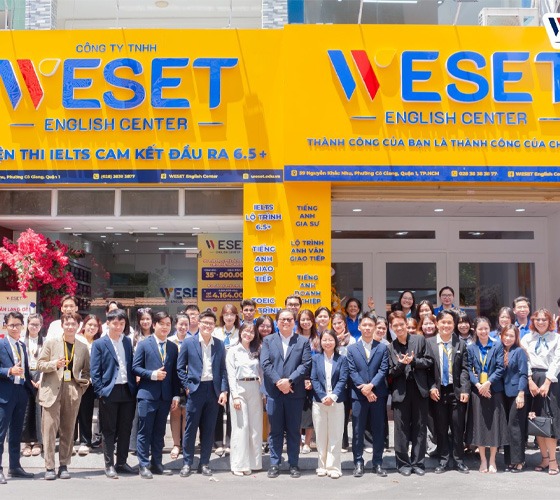
Chi nhánh Hồ Chí Minh
Địa chỉ: Trung Tâm Anh Ngữ WESET
Hotline: 028.38.38.3877
Tỉnh thành: Trụ sở chính

